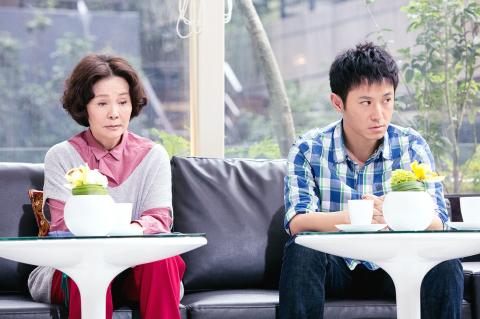Drawing from his own experiences as a gay man, Taiwanese-American filmmaker Barney Cheng (鄭伯昱) writes, directs and stars in Baby Steps (滿月酒), a comedy-drama about a gay couple searching for a surrogate to have their baby. While the movie offers a much-needed cross-cultural examination of issues surrounding the gay family, Cheng’s filmmaking effort is merely passable.
One of the few things he does right is casting veteran actress Gua Ah-leh (歸亞蕾) as Mrs Lee, a mother struggling to come to terms with her son’s sexuality and his non-traditional family. Cheng himself plays Danny, a Taiwanese-American who longs to start a family with his partner Tate (Michael Adam Hamilton) in West Hollywood, Los Angeles.
The couple’s journey is anything but easy. Danny tries out different agencies in a vain attempt to find an appropriate surrogate, and adding to the stress is Mrs Lee, who, after learning about her son’s plan, flies to Los Angeles from her home in Taipei to make sure that everything goes well so that she can have the perfect grandchild she always wanted.

Photo Courtesy of Hualien Media
Conflicts between mother and son inevitably erupt, as Mrs Lee refuses to accept her son for who he is, and always seems uneasy when Danny and Tate are together. Years after Danny came out, Mrs Lee still remains silent about her son’s sexuality in front of friends and relatives.
The journey to find a surrogate takes the trio to Mumbai, Bangkok and Taipei. Frustrated, Danny eventually turns to Mrs Lee’s Indonesian housekeeper Mickey — played by Love Fang (莫愛芳) — to be their surrogate. Knowing that the payment would help with providing a better life for her children back home, Mickey agrees.
After the baby is born, Mrs Lee has to decide whether or not to truly embrace her son and his family.

Photo Courtesy of Hualien Media
SCRATCHING THE SURFACE
Baby Steps is supported by strong talents on the production side. Besides the UK’s Stephen Israel, who is best known for the comedy-drama Swimming with Sharks, Taiwan’s Hsu Li-kong (徐立功) is also on board. Hsu is known for producing Ang Lee’s (李安) trilogy films, including The Wedding Banquet (囍宴, 1993) and Crouching Tiger, Hidden Dragon (臥虎藏龍, 2000).
Cheng’s film brings to mind The Wedding Banquet, specially since Gua also plays the mother role in the drama about a gay Taiwanese-American man who marries a woman to please his parents.
More than 20 years later, the issues tackled by filmmakers are no longer that of coming out or sexual identity — and Baby Steps aptly reflects this progress through focusing on non-traditional families. Yet, unlike Lee’s heartfelt analysis, Cheng’s dealing with patriarchal structures remain shallow, only feebly delivered by Mrs Lee’s eagerness to have an heir to carry on the family lineage.
What stays the same is Gua’s composed performance, and her ability to make an un-likable character lovable.

By 1971, heroin and opium use among US troops fighting in Vietnam had reached epidemic proportions, with 42 percent of American servicemen saying they’d tried opioids at least once and around 20 percent claiming some level of addiction, according to the US Department of Defense. Though heroin use by US troops has been little discussed in the context of Taiwan, these and other drugs — produced in part by rogue Chinese Nationalist Party (KMT) armies then in Thailand and Myanmar — also spread to US military bases on the island, where soldiers were often stoned or high. American military policeman

Under pressure, President William Lai (賴清德) has enacted his first cabinet reshuffle. Whether it will be enough to staunch the bleeding remains to be seen. Cabinet members in the Executive Yuan almost always end up as sacrificial lambs, especially those appointed early in a president’s term. When presidents are under pressure, the cabinet is reshuffled. This is not unique to any party or president; this is the custom. This is the case in many democracies, especially parliamentary ones. In Taiwan, constitutionally the president presides over the heads of the five branches of government, each of which is confusingly translated as “president”

An attempt to promote friendship between Japan and countries in Africa has transformed into a xenophobic row about migration after inaccurate media reports suggested the scheme would lead to a “flood of immigrants.” The controversy erupted after the Japan International Cooperation Agency, or JICA, said this month it had designated four Japanese cities as “Africa hometowns” for partner countries in Africa: Mozambique, Nigeria, Ghana and Tanzania. The program, announced at the end of an international conference on African development in Yokohama, will involve personnel exchanges and events to foster closer ties between the four regional Japanese cities — Imabari, Kisarazu, Sanjo and

Sept. 1 to Sept. 7 In 1899, Kozaburo Hirai became the first documented Japanese to wed a Taiwanese under colonial rule. The soldier was partly motivated by the government’s policy of assimilating the Taiwanese population through intermarriage. While his friends and family disapproved and even mocked him, the marriage endured. By 1930, when his story appeared in Tales of Virtuous Deeds in Taiwan, Hirai had settled in his wife’s rural Changhua hometown, farming the land and integrating into local society. Similarly, Aiko Fujii, who married into the prominent Wufeng Lin Family (霧峰林家) in 1927, quickly learned Hoklo (commonly known as Taiwanese) and